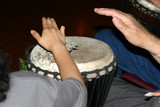The NAMM Global Report: Attitudes Toward Music in the United States
No one could deny the statement that music makes the world go around. We listen to it during exercise; we attend concerts and other events where music is a focal point. It blares behind us during almost every TV show, occasion, or during our workday. Without music, the world would seem completely quiet, despite the noise of our everyday lives. Every three years, the International Music Products Association or NAMM for short, conducts a poll to define the general public's attitude toward music. This survey measures many things including the likelihood of playing an instrument, where those individuals access their instrument instruction, and which gender is most likely to pick up an instrument and learn it on their own. Most data has remained stable across the past 3 years, but there have been some interesting changes to note.
81% of respondents regret not learning to play a musical instrument. Don't be one of them. Hand drumming on a djembe is a great way to learn rhythm in a positive, community environment. The cajon is also a great choice for beginner drummers.
During this survey, males and females were found to be almost equal in that they both play music instruments. There was no great deviation of males playing more than women. There was however, a huge jump of music playing for both genders under the age of 18. The percentage in 2000 of those under the age of 18 playing an instrument was 29%, but this figure jumped to 35% in 2009. This correlated with an increase in correspondents stating that the decision to play music was a joint decision and not individual. 45% stated that their parents encouraged them to play music. Parents appear to be more aware of the benefits of musical education and are influencing their children to become more involved.
In contrast, those in the age group of 18 to 34 saw a significant decrease in those who play music, dropping from 32% in 2006 to 24% in 2009. This may be due to the economic crisis, as many in that age group saw a drop in income or could have possibly lost their employment, therefore not being able to afford a musical hobby. The use of private lessons saw a slight decrease as well.
Although the NAMM poll saw that there was an even split between those who bought new and those who purchased used instruments, when the respondents did purchased, over 51% stated that they preferred to purchase in a specialized retail environment.
For those respondents with children in school, it was found that parents were encouraging their children more than ever to focus on music in school. The 5 to 11 year old age group increased since 2006. This could be due to better music programs in the schools. Many who were surveyed believed strongly in music education in the schools, and even stated that a state mandated music program would be a good idea. It was widely believed that children who participated in music programs were considered well rounded, and those surveyed were strongly on the side of infant music education and a larger music program in preschools.
Not learning a musical instrument tends to become a big regret in people's lives, with over 81% stating that they wished they had picked up an instrument, and over 60% of those people feeling they were too old to learn.
Every once in awhile it is useful to have a reminder as to how important the practice of playing music is. Whether it is enriching our children's education or allowing teenagers self-expression, learning and playing an instrument is a vital part of our lives.
Recent Posts
-
Incorporating the Thumb Piano into Modern Music Production
Introduction to the Thumb Piano The thumb piano, also known as the Kalimba or Mbira, is a small …15th Apr 2024 -
The Top 5 Djembes for Beginners: A Buyer's Guide
What is a Djembe? A Djembe is a type of drum originating from West Africa, traditionally made from …13th Apr 2024 -
Hand Drums 101: Techniques and Tips for Beginners
Introduction to Hand Drums Hand drums come in various shapes and sizes and are played by hand rath …1st Apr 2024




